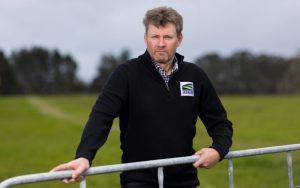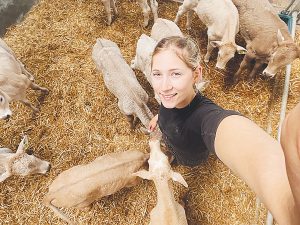
What do you enjoy about farming?
I love cows. Cows are my babies.
What are your biggest challenges on-farm?
Finding the time to get everything done and finding the money to do it. When I sold up and came here, the bottom dropped out of the market, so the cows I sold earned way less than I expected. I also needed to put in an effluent system when I arrived, which meant borrowing more. So, money’s been a constant pressure.
Do you have a plan to ease the burden?
Yes, I’m selling off a parcel of land for a new subdivision. Hopefully that will increase my equity, but like most farmers I don’t count my chickens until they’re fluffy and all laying eggs.
That sounds stressful. What do you do to keep yourself well and keep going?
I’m a bit of a loner, but I’ve slowly built a support network. I came up here by myself, so it’s taken time.
You’ve been involved in Neighbourhood Support as well, haven’t you?
Yes, I’m one of 24 houses that are part of it round here. We did a Christmas thing and we also did something at Easter. I went down and hung out with everyone and took photos. It’s great just to get more involved with your community, especially with the way the world is now. We need to know our neighbours better and be supporting each other. Neighbourhood Support is a great way to do that.
Why do find time for these activities when you’re so busy?
Even if you’re a farm owner, with no money, working alone like me, there’s still quite a bit that you can do to help other people. It’s a real feel-good thing too. You get a lot out of it.
For example, there were a couple of older ladies down the road that I’ve visited in the past and they really appreciated it because old people get lonely. But it’s a two-way street too. Both of these ladies were real hard cases, tough as. Both of their husbands had died when they were young. They had kids to raise and also had to take over running farms. Hearing stories like that helped put my own struggles into perspective. What I’m doing here is nothing compared to that. I’m just continuing their tradition of women working hard and sticking at it. Head down, bum up.
Workload must be a real issue when you work alone.
I think it’s more of a mental thing. There is no back-up, so sometimes I just need to suck it up and do what I can. But as long as the cows are fed, watered and milked, I feel okay. Even if it takes ’til late at night sometimes. Over quiet periods I also cook up a whole lot of dinners, put soup into containers and make sure the shed’s full of firewood to save time.
Any other tips for people living and working alone?
One thing I do when I’m really busy is make myself come home during the day and have a coffee break and look at the paper. Refresh physically and mentally. Then before I head back out, I turn the lights on, so that when I come home at night it doesn’t feel like I’m coming home to an empty place. It sounds like a small thing, but it makes coming home feel a lot different.
What do you do to unwind?
I’ve got my dogs and my cows. At the end of the day, I’ll grab a beer and go and have a drink with my ‘girls’. A moment like that reminds me of why I’m doing what I’m doing.
What about hobbies?
Cows are my job and hobby. I like milk and sometimes I make cheese. Before the pandemic I used to enjoy getting WWOOFers (people who visit your farm as part of Worldwide Opportunities on Organic Farms initiative) in. At the end of a day, we’d have cow cuddles and make cheese so they had a good experience. That was a great way for me to wind down and enjoy their company too. Hopefully that will be possible again soon.
Is there a particular mindset that helps you keep going?
One thing I love about working for myself is that if something goes wrong there’s no debate about whose fault it is. A lot of couples and work mates get caught up in the ‘you should’ve done this or that’ stuff, which can be incredibly stressful. Here it’s not an issue. I don’t need to waste time thinking about whose fault something is, I can just concentrate on fixing it.
What about those days when nothing seems to go right?
It’s vital when you live alone that you know you can connect with others if you need to. If I’m having an off day, there are people I can just ring up and say, ‘hey I need a hug’. For example, I lost a dog last year. He was stolen. I spent weeks driving around putting up posters. One night I was on the side of the road having a cry and the neighbours drove past, jumped out the car and gave me a big hug. You can’t put a value on that stuff.
Do you celebrate your wins?
That’s a good question, because when you work alone you can get blind to them. It’s easy to just drive around and see the jobs that still need doing. But work has to be more than just a to-do list.
When I came here the land was dead. There were no worms. There were no pūkekos because there was nothing for them to eat. Now there are pūkekos, grey ducks and the other day the neighbours spotted a weka. I’ve also planted lots of trees and got 23 hectares of native bush going. So, to me, the land is nearer to being back in balance. It’s not just bald paddocks. I guess my reward is that I feel at home here. I’ve put in the blood, sweat and tears and this is my home.
What’s your main message about keeping well on-farm?
The first couple of years I had a rule that I had to make progress every single day. But I soon learnt that sometimes that’s just not possible. Just like the land, the people on it need to be sustainable too. I haven’t got back-up here, so I’ve learnt I have to look after myself.
How would you sum up your progress?
It’s only a little farm, but when I came here there were no fences, no water and literally hectares of weeds as tall as a house. Here in Northland, most of my neighbours are Māori and really in tune with caring for the whenua. I love that idea of guardianship. That we all come from the land and there’s nothing we can do without it, so we must take good care of it.
If that’s what defines my life – that I had this little bit of land and improved it, I think that’s a cool thing. I love the idea that when I leave here, this land is going to be in a much better state than when I came.
























